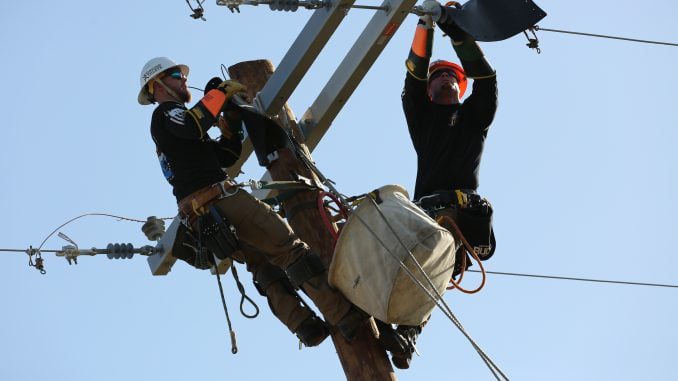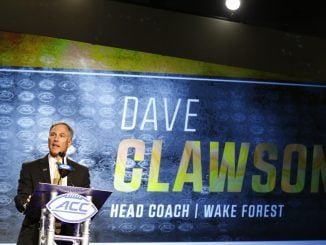
The power poles stretched across the landscape near Holding Village in Wake Forest. Just days earlier, the grassy field had been vacant, but, seemingly overnight, this man-made forest had sprung up. The poles were arranged, side-by-side, in tight rows.
Figures dangled from the top of several poles, giving the scene a look of a post-apocalyptic public execution. Upon closer inspection, however, they were life-sized dummies, patiently awaiting rescue by the contestants in the Public Power Lineworkers Rodeo.

The event is a two-day test of knowledge and skill. It serves as the national skills championship for the nearly 100,000 public power workers — the men and women who climb the poles to keep electricity running to our homes and businesses.
“They are the backbone of our community,” said Wake Forest mayor Vivian Jones. “Without them we wouldn’t have power.”
For the first time in its 18-year history, the rodeo was held in North Carolina. Unfortunately, it wasn’t the first time many of the visiting workers had scaled utility poles in the state.
“We talk about hometown heroes, and the people all across our state that really do make our communities work,” Lt. Gov. Dan Forest said at the rodeo’s opening ceremony. “You really do that. Many of you who aren’t from North Carolina have been here before. We’ve seen your trucks lined up for miles and miles and miles, traveling across our state to come help out our communities after hurricanes. You step up at times when nobody else would even think about it, to reach out and help people that maybe you never meet, never get to see, never get to know.”
After spending Friday taking a written skills test, the veterans and apprentices competed in separate events on Saturday, testing the lineworkers’ ability to perform tasks such as scaling poles to change out insulators and amp switches. The dummies were part of the Hurtman Rescue event, requiring competitors to climb up and save an injured coworker, cut him loose from his protective harness and safely lower him to the ground within four minutes.
“It’s something you hope you never have to do on the job,” said Cedric Vinson, an apprentice for the city of Gastonia who has been on the job since December. “But we have to be ready, just in case.”
Gastonia spent about one day a week for the first few months of the year preparing for the event. It was easy to devote the time, since the tasks they performed at the rodeo were all critical skills.
“Each of the events are things that a lineworker would be expected to do as part of their job,” said Wally Haase, the chairman of the American Public Power Association. “We don’t try to push them. It’s not based on who does it fastest but who demonstrates the skills properly and safely.”
For an event billed as the industry’s national championship, the rodeo focused less on cutthroat competition and more on building camaraderie among the various power companies.
“Each of the events are things that a lineworker would be expected to do as part of their job.” Wally Haase, American Public Power Association chairman
Hugo Mier of the North Carolina Association of Municipal Electric Systems was invited to participate in the opening ceremony’s version of the Olympic torch lighting — scaling a pole to raise the flag — because he was a previous winner of the state competition. Underscoring the de-emphasis on winning, he had trouble remembering what year he’d taken the title.
“I guess it must have been 2016?” he said. Mier’s four-man group also finished fourth nationally in last year’s rodeo, held in San Antonio.
“They’re not just competing. They’re networking,” said Jones. “It’s a time to learn safety techniques.”
Still, when it was time to scale the power pole, the lineworkers felt the competitive juices stir.
“I think the biggest piece of advice I can give them is just to relax,” Haase said. “You can see them get nervous.”
That was the problem afflicting Brandon Phillips, another one of Gastonia’s apprentices. Like Vinson, he was able to rescue his hurtman in the required time, but he wasn’t happy with his technique.
“First round didn’t go too good,” he said. “I dropped the rope and made a few mistakes. Nerves got to me, and I got all jittery.”
Vinson and Phillips then headed to event that most worried them — the rope toss, requiring lineworkers to knot a rope to an anchor on the ground, then throw it over the top of the pole so they can anchor it on the opposite side.
“It’s not the same rope we practiced with,” Phillips said. Early reports from the venue warned that the rope was wet from morning dew, making it heavier and harder to clear the top of the pole.
Despite the struggles, the new linemen were given a valuable learning experience, and one that was entertaining for the gathered crowd of Wake Forest residents to watch.
“I’ve only seen these things on YouTube before,” Forest said. “So I’m excited to see it in person.”



